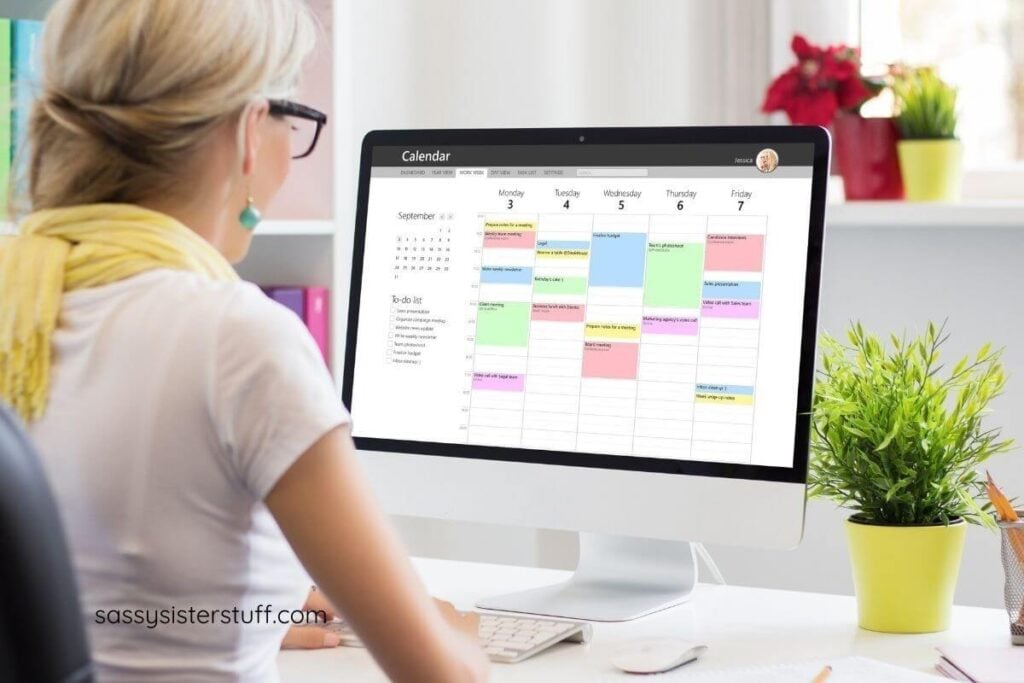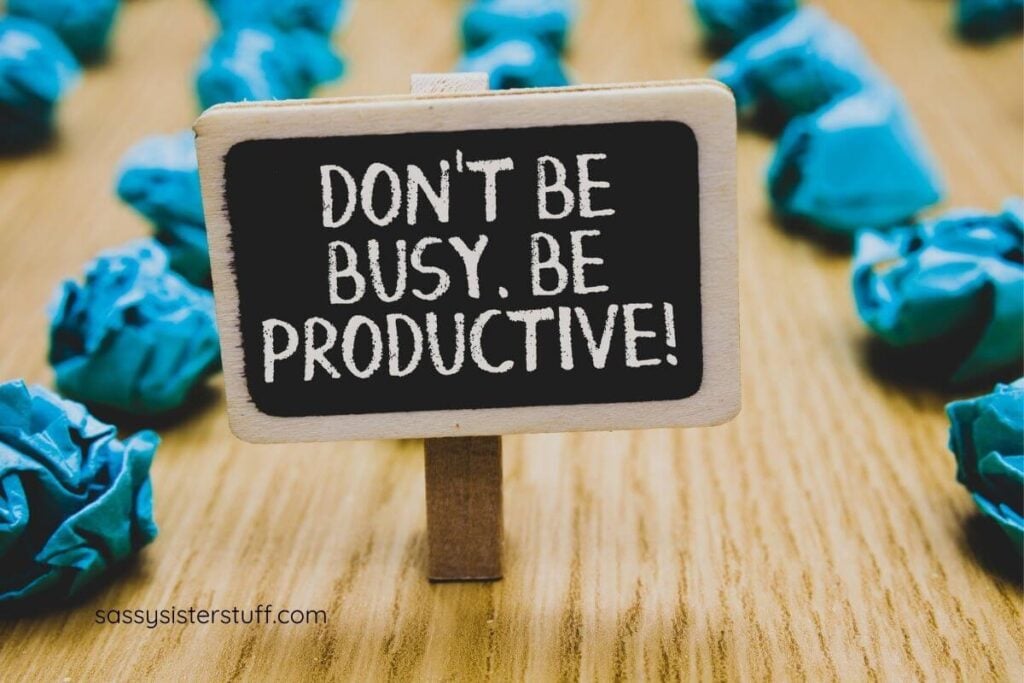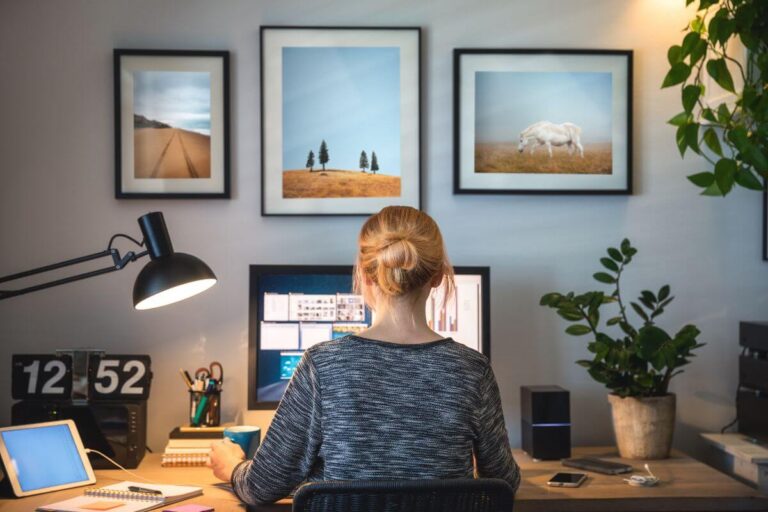8 Easy Ways to Be More Productive Every Day and Become More Intentional
Boost your productivity with these 8 actionable steps. Learn to manage distractions, foster concentration, and create mental habits that support clarity every day, while becoming more intentional.
For many women, achieving balance in life feels like solving a never-ending puzzle. With societal pressures, career responsibilities, and familial demands—not to mention the unique challenges of midlife—maintaining focus becomes an uphill battle. But with the right mindset and strategies, you can learn to be more productive every day.

The key lies in acknowledging how external factors shape your focus and understanding how to sharpen your ability to tune into what truly matters. This, my friend, is the power behind becoming more intentional.
Let’s look at 8 ways you can become more productive and intentional every day! You’ve got this!
Ways to be More Productive Every Day and Become More Intentional
Being productive isn’t about cramming more tasks into your day—it’s about focusing on what truly matters and using your time wisely.
And being intentional means making conscious choices that align with your goals and values, rather than running on autopilot.
When you combine the two, you create a daily rhythm that sets you up for greater productivity and intention.
The good news? You don’t need to overhaul your entire life to create this daily rhythm. Small, consistent changes can shift your mindset and habits in powerful ways that get you there.
Here are 8 easy, practical strategies you can start using right away to be more productive and intentional every single day.

1. Recognize What Distracts You
Distraction often steals attention, leaving us feeling unproductive. However, distractions don’t come out of nowhere; they’re typically tied to stressors in our environment.
These could be anything from ongoing notifications on your phone to overly busy schedules that don’t allow for breathing room.
To eliminate distractions, you need to start identifying the specific sources of disruption in your life.
Consider your typical day. Does the constant flux of messages derail you from completing tasks? Or is it internal worry about unfinished chores?
Digital distractions in today’s world can be highly intrusive. Aim to limit interruptions from social media or emails by turning off notifications while working.
“You will never reach your destination if you stop and throw stones at every dog that barks.”
~ Winston S. Churchill
Temporarily disconnecting ensures fewer breaks in concentration, allowing you to immerse yourself in whatever you’re tackling.
Recognizing these elements clears the way for better habits to take form. Small adjustments, such as setting boundaries or organizing uninterrupted blocks of time, can immediately improve focus.
Still, distractions aren’t always external. Mental clutter often competes with your attention, creating anxiety and hindering your ability to engage fully.
For this reason, making time to clear your mind (be it through journaling or activities like running) can serve as a significant reset button for sustaining focus later.
2. Structure Your Day for Better Results
A lack of structure can leave anyone feeling overwhelmed. It’s difficult to concentrate when the day holds no clear order.
To combat this, build a rhythm or flow throughout your week. Consider this thought experiment: which actions give you the most energy?
Early risers tend to benefit from tackling high-priority tasks during the morning hours, while evening-oriented individuals often feel more productive in periods of solitude after the world has slowed down.
Whichever applies to you, working with your natural rhythm can counteract fatigue and procrastination.
Daily planning isn’t about micromanaging every detail. Instead, it’s about forming a realistic outline that directs your focus toward what’s achievable and reduces time wasted on low-priority distractions.
Adding moments of flexibility within your schedule leaves room for adjustments without spiraling into chaos.

3. The Role of Environment in Sharpening Focus
Your surroundings strongly influence productivity. A cluttered, disorderly workspace can drain motivation, while a calm, thoughtfully designed area fosters a sense of control.
Maintaining an environment conducive to concentration doesn’t necessarily mean perfection, but rather, intentionality.
For some, that could mean a dedicated desk free of household clutter. Others may feel most focused in a bright, naturally lit space filled with subtle visual inspiration, such as artwork or cheerful greenery.
Believe it or not, even colors influence mood and energy levels. Cooler tones often aid relaxation, while bright accents may stimulate creativity.
Even music can play a role in sharpening your focus. If you enjoy a particular genre of music, play it softly in the background to help you relax and prepare for a productive day.
4. Develop Mental Habits That Support Attention
Building focus and attention must be intentional on your part. Specific mental practices redirect wandering thoughts and strengthen concentration over time.
Meditation can improve clarity, but even simple breathing techniques can work wonders.
Paired with mindfulness, grounding exercises can help busy women reconnect with the present, especially during high-stress periods.
One approach could involve actively engaging your five senses, like holding a warm cup of tea and savoring its aroma before refocusing on lingering tasks.
Not all mental strategies need formal practices. Setting intentions is another tool for narrowing focus, reminding yourself of both immediate and long-term goals.
Anchoring tasks to these intentional thoughts encourages you to act meaningfully rather than approaching projects by feeling scattered or disconnected.

5. Manage Energy, Not Time
Focusing on preserving energy boosts productivity comparably, if not more effectively, than devoting attention solely to calendars.
Consider the last time your exhaustion inhibited basic concentration. This barrier occurs because mental energy directly correlates with cognitive performance.
Prioritize elements like nutrition, hydration, and adequate rest.
Not sleeping enough or skipping breakfast inevitably reduces your ability to power through challenging moments later in the day.
Physical self-care might seem unrelated to focus, but it bolsters the stamina necessary for showing up fully in your work or personal tasks.
Equally important is finding activities that restore energy after draining efforts.
For some women, this might involve short walks outdoors. Others may gain motivation by reconnecting with close friends.
Choose habits that renew, not deplete, to keep both productivity and well-being aligned.
6. Address Common Behavioral Patterns That Disrupt Focus
Another factor that can make you feel less productive is ADHD. For women balancing heavy workloads, the most common ADHD triggers, such as stress and anxiety, can create additional layers of frustration.
Factors like multitasking, however tempting, frequently reduce output quality by overstretching your attention.
By intentionally choosing to focus fully on one responsibility before addressing the next, you’ll see improved consistency.
Similarly, external noise or unanticipated interruptions require careful management, whether it’s learning to say no to overpacked schedules or verbalizing personal boundaries in shared households.
Don’t underestimate how influential minor lifestyle modifications become over time. Do you need to have a discussion with your family about your work hours? Do you need to learn to ignore the Amazon delivery that was just dropped off on the front porch? 😉
Valuable Read? Save for Later!
7. Turn Focus Challenges into Growth Opportunities
One remarkable upside of learning to sustain focus lies in the chance to refine your approach continually. Moments where attention wavers are teachable ones, often requiring reflection or small course corrections.
These occasions shouldn’t feel defeating; rather, they hold insight into what approaches might improve outcomes moving forward.
Ask yourself questions following less productive days. For instance, was it due to scheduling oversights, environmental distractions, or decisions that drained mental energy unnecessarily?
This proactive evaluation unlocks self-awareness that you can build upon each time the scenario arises again. For me, I often find a sleepless night causes me to be less productive so I know I need to get more rest.
Ultimately, meaningful progress doesn’t amount to immediate perfection; incremental shifts gradually combine to reshape outcomes holistically. You can develop better habits over time that help with productivity.
8. Take Charge and Achieve Clarity
Mastering focus may sound complex at first glance, but every small victory lays a foundation for broader success.
Building focus involves more than isolated tactics; it’s an integrated alignment between intention, habits, and the optimal use of tools.
By taking steady actions toward leveraging your strengths, you’ll enhance the depth of engagement in daily routines and gain clarity in addressing life’s bigger priorities.
“Stay focused, ignore the distractions, and you will accomplish your goals much faster.”
~ Joel Osteen
Growth doesn’t hinge on balancing every plate flawlessly. Instead, success lies in understanding which plates matter most and devoting your fullest attention precisely where necessary.
Tomorrow’s progress begins largely with today’s preparation, so there’s no better time than now to take that first step forward toward developing new habits that support improved productivity.

Final Thoughts
As you become more intentional and foster a sense of control in your life, you’ll discover that you have begun to be more productive every day! You’ll get your chores done, find time for self-care, make dinner every night, and go to bed on a regular schedule.
Practice these easy ways to be more productive every day for 21 days and they will become habits that change your life! (Did you know it takes 21 days for a behavior to become a habit?)
Now that you have the tools and knowledge you need to become more productive, it’s time to wake up and do it, my friend! Stop procrastinating and start changing your life today! You won’t be sorry!
Be sure to check out these Related Articles:
- A Year of 28 Day Challenges for Personal Growth – an article about building new habits as part of your personal growth journey.
- 21 Reasons Why It’s Perfectly Okay to be a Night Owl – learn more about natural rhythms of the body that make some people more productive at night.
Love to ALL! ~ Susan








